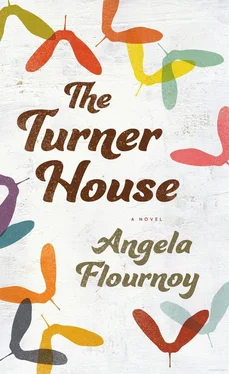These practiced lines—perhaps Googled, perhaps fed to her by that Tawny person she kept mentioning the other day, or Rob himself—didn’t sound right coming out of Brianne’s mouth. Lelah split the money in half, put one stack of bills in her purse and held the other stack back out.
“Just take a few hundred. Gas alone for that van, plus your car is gonna be a couple hundred. I don’t want nothing for it. I swear.”
Brianne dumped the papers from the overflowing wastebasket into a big black trash bag. She stopped a few times to fish out certain slips of paper and tear them into smaller pieces.
“I am sorry, Brianne, genuinely sorry for the other morning. I came at you all wrong, cause I was embarrassed to have lost everything. But I’m okay now, money-wise, for a little while. And I didn’t mean what I said about . . . about anything I said.”
It was very hard to say. Evidently Troy wasn’t the only one who was out of practice with apologies.
“How about this?” Brianne said. “I’ll take the money if you promise to go to GA.”
Lelah could picture her searching online for such a solution. Brianne had always been solution-oriented; a list maker, a task manager. Lelah tried to focus on the obvious love behind an action like that, but it was humiliating. How did Brianne have all of the bargaining chips? She was giving the child money, damn near throwing it at her, and still she had no leverage. No leverage at all.
“GA stands for Gamblers Anonymous, Mommy.”
“I know what it stands for. I been there before. I don’t know. I gotta keep looking, maybe something else besides GA is for me. I’m not gonna sit here and promise to go do something, and then maybe not go. I’m done lying to folks.”
Brianne shook her head and laughed, incredulous.
“Okay,” she said. “Well. Here’s what you can do for me. This is about the only thing you can do for me at this point, so if you say no, then I guess it just is what it is. You tell me everything, from beginning to end, about Vernon Greene, and you and me, and Missouri. Everything you can remember, and I’ll take that money.”
A not unreasonable request. It troubled her that her daughter might consider this the hardest thing she could ever ask her for. What sort of person denied her child such basic information? And how had Lelah convinced herself that Brianne would be fine without having it? Flawed as it had been, it wasn’t a fling that conceived Brianne but an actual marriage to a person whose last name Brianne still carried. The things we do in the name of protecting others are so often attempts to spare some part of ourselves.
It took nearly three hours for Lelah to re-create Vernon for her daughter, starting from the very first time she’d seen him jumping hurdles at a track meet at Cass, to that final afternoon she’d seen him nodding off in the freezing rain. Lelah filled the stories with details she hadn’t thought about in decades, like his first car, a 1980 Cutlass Supreme, and what she’d worn to their courthouse marriage (a baby-pink knee-length dress with aggressive shoulder pads). She took her time, because she never wanted to repeat these stories again. The two of them folded clothes into bags, packed boxes, and sorted through piles and piles of junk. By three o’clock they’d gotten Brianne in good shape to leave her mother and Detroit behind.
Humans haunt more houses than ghosts do. Men and women assign value to brick and mortar, link their identities to mortgages paid on time. On frigid winter nights, young mothers walk their fussy babies from room to room, learning where the rooms catch drafts and where the floorboards creak. In the warm damp of summer, fathers sit on porches, sometimes worried and often tired but comforted by the fact that a roof is up there providing shelter. Children smudge up walls with dirty handprints, find nooks to hide their particular treasure, or hide themselves if need be. We live and die in houses, dream of getting back to houses, take great care in considering who will inherit the houses when we’re gone. Cha-Cha knew his family was no different. The house on Yarrow Street was their sedentary mascot, its crumbling façade the Turner coat of arms. But it disintegrated by the hour. Mold in the basement, asbestos hiding in the walls, a garage stolen. He understood these things pointed to abandonment. He knew he should walk away from the place, let it become one more blasted-out house in a city plagued by them. But what to do with the house and what to do about his mother’s sickness were problems to which Cha-Cha possessed no simple solution. In both cases his impulse leaned toward preservation, but at what cost? If Viola wanted to die, who was he to stop her? If the house was destined for atrophy, why fight it? What he’d felt in that backyard with Lonnie was helplessness; it had only looked like rage. What happened to control? Control used to come effortlessly to Cha-Cha, and not because he was power-hungry or ego-starved. A pack of wolves. A murder of crows. All groups needed order. He felt the loss of control like a loss of basic reason. A dark splotch on his frontal lobe. Why not give in to every impulse, break free and go insane, if he lived in a world where people made structures disappear overnight?
On Thursday morning Russell arrived, as did Sandra and Berniece. The former claimed the second guest room. His sisters went to Francey’s. That evening Miles, Duke, Quincy, a passel of nieces who were improbably womanly, and nephews newly graduated from knuckleheads to respectable young men descended. A full house if Tina wasn’t missing.
The visiting Turners filed into his mother’s room one by one or in pairs. They sat and watched TV with her, brought her food, and filled her in on what the beings that had sprung from her being were doing out in the wide world. Everyone wanted to go to Yarrow and inspect the scene of the garage heist. Cha-Cha let them take his car. He didn’t join them. On Friday night, the eve of the party, the out-of-towners met up at Cha-Cha’s and piled into cars for a casino buffet. Cha-Cha begged off, as did Lelah, for obvious reasons. She claimed to be exhausted and went to bed early, without checking on Viola or saying good night. Cha-Cha inflated all of the air mattresses and left a heap of comforters on the couches for pallets on the floor. It was 8 P.M.
OLD FOLKS WERE supposed to be accustomed to suffering. Viola knew this. No one wanted to hear an old lady complain about aches in her chest, or throbs under her armpits, or stinging, scalding sensations in her disobedient legs. The young couldn’t keep an old lady from hurting, so they’d rather think that there existed a threshold one crossed where it ceased to matter. Selfishness. Viola counted getting the doctors to prescribe her stronger medication as her last significant victory on this earth. She was proud of speaking up for herself and claiming what little say-so she could about what happened to her body. For saying no more of this , but I do need more of that . The only drawback was the fog. When she felt the least amount of pain her thoughts became the most jumbled. Following a single thought to its logical end was like trying to catch a fish with bare hands. But when the drugs subsided, and the hurt hammered down, her mind was as clear as ever. Right now she could feel every part of herself. The pain had yanked her awake, if she had indeed been asleep. She had stopped keeping strict track of time when she moved off of Yarrow and into this room, but she estimated that if no one brought her any pills, she had half an hour before the truly crushing, vision-blurring pain began. She couldn’t remember when her fear of pain had first started trumping her fear of death.
Читать дальше












